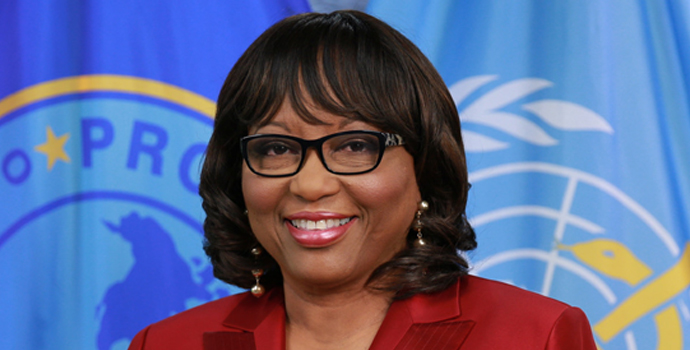
PAHO calls for breaking down barriers that keep one in three people in the Americas from accessing healthAt a special World Health Day event, PAHO Director Carissa F. Etienne and former president of Chile Michelle Bachelet urged collective action to ensure that all people, everywhere, have access to health
World Health Day will be observed on 7 April 2018.
Washington, D.C., April 4, 2018 (PAHO / WHO) — On the eve of World Health Day, the Director of the Pan American Health Organization (PAHO), Carissa F. Etienne, and former president of Chile Michelle Bachelet today called for collective actions to ensure that all people, everywhere have access to the health services they need.
In the Americas region, one-third of the population faces obstacles to accessing health. “Health is a right, and as such we must overcome barriers to have access to care,” said Etienne, noting that out-of-pocket payments that many people must make to obtain health services “constitutes the main barrier and pushes families towards poverty.”
Other barriers are geographic or institutional in nature, including stigma and discrimination in health services. “It is not enough to have hospitals and health centers, these institutions must have the right combination of human resources, infrastructure and equipment, medicines and other health technologies, to avoid long waiting times and offer quality care,” Etienne said.
Universal health, the theme of World Health Day 2018, implies that all people and communities have access, without discrimination, to quality health services without having to expose themselves to financial difficulties. Under the slogan “Universal Health: Everyone, Everywhere,” the campaign calls on representatives of governments, academia and civil society to stimulate dialogue on policies that can help achieve health for all by 2030.
“We need a massive regional movement and listen to all voices” to move towards universal health, Etienne said. Last year, PAHO created the High-Level Commission on “Universal Health in the 21st Century: 40 Years of Alma-Ata,” led by Michelle Bachelet.
To achieve universal health, “we have to build national consensus because the challenges are of such magnitude that they require the commitment and effort of all,” said Bachelet.
Forty years after the Declaration of Alma-Ata—which promoted the values of the right to health, equity and solidarity—the region of the Americas continues to be one of the most inequitable in the world.
Bachelet noted that there have been important advances since Alma-Ata, but that there are still major gaps between and within the countries. “At the same time that we see health centers with quality we could not have imagined in the past, there are still women and children who continue to die from totally avoidable causes,” she said, adding that “inequality is the great enemy in Latin America and the Caribbean.”
Bachelet said that PAHO’s regional strategy for universal health along with the Sustainable Development Goals (SDG) and the sustainable health agenda for the Americas infuse new life into the path toward “health for all” outlined at Alma-Ata. She urged greater emphasis on health promotion and disease prevention, reducing segmentation and fragmentation in health services, safeguarding the working conditions of health personnel, including new technologies and innovation, and for building health financing systems that promote solidarity.
“In this matter there are neither miracles nor shortcuts, what there is a long road of collective work that leads to more justice for all,” said Bachelet.
###
Helpful links:
World Health Day: www.paho.org/whd
Live stream of the conference: https://livestream.com/pahotv/WHD2018
Campaign materials: www.paho.org/world-health-day/?page_id=820
Video: www.youtube.com/watch?v=VGr1l-DQK4Y
WHAT IS PANCAP?
PANCAP is a Caribbean regional partnership of governments, regional civil society organisations, regional institutions and organisations, bilateral and multilateral agencies and contributing donor partners established on 14 February 2001. PANCAP provides a structured and unified approach to the Caribbean’s response to the HIV epidemic, and coordinates the response through the Caribbean Regional Strategic Framework on HIV and AIDS to maximise efficient use of resources and increase impact, mobilise resources and build the capacity of partners.
What are the Global AIDS Strategy 2021–2026 targets and commitments?
If targets and commitments in the strategy are achieved:
- The number of people who newly acquire HIV will decrease from 1.7 million in 2019 to less than 370 000 by 2025
- The number of people dying from AIDS-related illnesses will decrease from 690 000 in 2019 to less than 250 000 in 2025.
- The goal of eliminating new HIV infections among children will see the number of new HIV infections drop from 150,000 in 2019 to less than 22,000 in 2025.
What are the 95-95-95 Targets for ending AIDS?
- 95% of People Living with HIV know their HIV status;
- 95% of people who know their status on treatment; and
- 95% of people on treatment with suppressed viral loads.
HELPFUL LINKS:
Global AIDS Strategy 2021–2026, End Inequalities, End AIDS
https://pancap.org/pancap-documents/global-aids-strategy-2021-2026-end-inequalities-end-aids/
Caribbean Regional Strategic Framework on HIV and AIDS (CRSF) 2019-2025
https://pancap.org/pancap-documents/caribbean-regional-strategic-framework-2019-2025/
